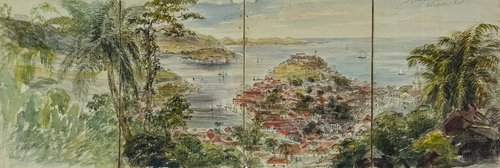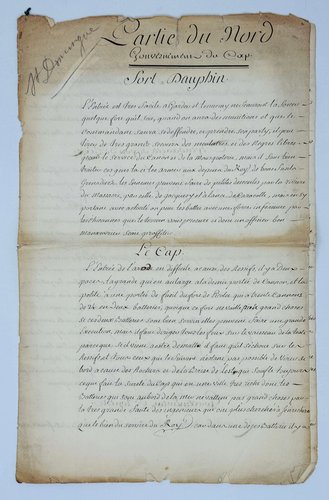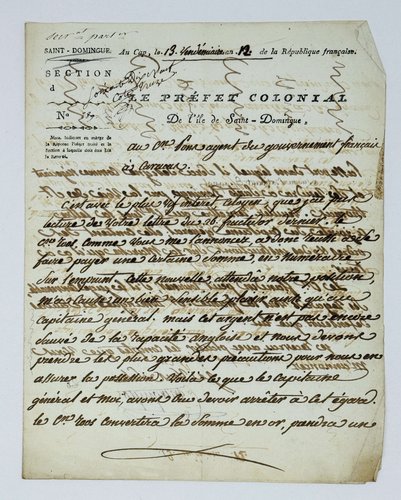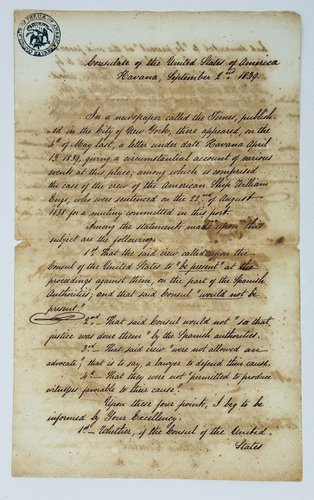









#M46
1781
Three folded Folio manuscripts: two folio bifoliums ca. 36,5x22,5 cm and ca. 44x27,5 cm, and a single folio leaf ca. 40,5x26 cm. 3, 3 and 1 pp. All written in brown ink on watermarked laid paper, each docketed on the last blank page. Two signed by deponents and notaries, one with two tax stamps and a notarial seal. Fold marks, but overall a very good collection of manuscripts written in a legible hand.
Historically significant collection of three original manuscripts documenting the voyage to Jamaica of a British merchant brig “Jane” in August 1780 – March 1781, with a detailed eye-witness account of the Savanna-la-Mar Hurricane on October 3, 1780, which seriously damaged “Jane” and destroyed a large part of her cargo. The Savanna-la-Mar Hurricane ran on October 1-3, 1780, mostly affecting Jamaica, where it destroyed the community of Savanna-la-Mar and Lucea, killed 360 people in the town of Montego Bay and sank several British naval ships (“Monarch,” “Victor,” “Barbadoes,” “Scarborough”). The hurricane is a part of the 1780 Atlantic hurricane season, which became “the deadliest Atlantic hurricane season in recorded history” (Wikipedia).
The collection includes an affidavit signed by “Jane’s” Captain James Jones, first mate William Barrey and boatswain Sever Brown, with an hour-by-hour account of the events on board during the hurricane on October 3, 1780. The affidavit, dated “Montego Bay, January 10, 1781”, was witnessed by Samuel Mottershed, Esq. (a Justice for the St. James parish, Jamaica) and certified by Ralph Montague (notary public in Montego Bay, St. James parish). The second document is an extensive “Declaration of a protest,” signed by Captain Jones and first mate William Barrey, which describes the entire “Jane’s” voyage with an emphasis on the events of the hurricane and its outcomes, including the description of the direction and strength of the wind and the rising of the sea level on October 3. The document is dated July 24, 1781 and is certified by London notary Wilson Forster. The last document is a period copy of Jane’s portledge bill (January 1780 - September 1781), listing twenty-six crew members (including Captain), their stations (boatswain, cooks, mates, seamen, boys), length of service and wages due and paid. Overall an important eye-witness account of the 1780 Atlantic hurricane season.
A brief history of “Jane’s” 1780-81 voyage to Jamaica:
The brig arrived in Kingston from London on August 1, 1780, under the escort of HMS “Thunderer” and other British men-of-war. On August 21, she sailed for the Black River where she received a cargo of logwood, mahogany and pimento. On August 29, “Jane” arrived to Montego Bay, where she received a cargo of sugar. On October 2, she moored in the mouth of the Great River, seeking asylum from the storm. On October 3, due to hurricane winds and the change of wind direction, the brig was driven to a reef where she was struck against the rocks many times, losing her lifeboats and a part of the cargo. “Jane” was taken off the reef only on October 22. The cargo, anchors and guns were reloaded in order to lighten the ship; some part of the cargo was never recovered. “Jane” returned to Montego Bay on January 27, 1781 and then went to Port Royal. On March 17, she left Jamaica for London in a convoy of ninety merchant ships, protected by HMS “Egmont,” “Graffton,” “Trident,” “Bristol,” and “Endymion,” and endured several storms during the voyage, which forced the crew to have “pumps constantly going.” “Jane” arrived in London on July 23, and the next day the Captain filed the Declaration of protest “against the Seas and bad weather, and particularly against the Violent Hurricane which the said Ship met with in Jamaica...”
Excerpts from the documents:
1) The Affidavit.
“James Jones, Commander of the Brig or Vessel called the Jane now laying at Great River in the parish of Saint James in the Country of Cornwall and Island of Jamaica, Sever Brown Boatswain of the said Brig or Vessel and William Barrey, Chief Mate on board the said Brig or Vessel being duly sworn make oath and say <…> that on Thursday the Third day of October last as the said Brig or Vessel was then laying safe moored at Great River aforesaid with the two bower anchors, the wind blowing excessive hard at North East with hard showers between the hours of two and four of the clock in the afternoon they were obliged to strike the yards and topmast of the said brig or vessel and wear away cable to long service. And these deponents further say that at about the hour of six or seven of the clock of the same afternoon the wind flew round to the south-east and blew a violent storm of wind with constant rain, which forced the said brig or vessel to drive on the reef an exceeding high sea at the same time doing which caused the said brig or vessel to strike with great violence on the reef and make a great deal of water and tore great part of her sheathing off and much damaged her rudder and irons. And this deponent James Jones for himself saith that on Tuesday the said Third day of October at the time the said storm happened <…> he was then on shore at a place called Unity Hall estate in the said parish of Saint James adjoining upon Great River aforesaid and saw the said accident happen to the said brig or vessel <…> And these deponents James Jones, Sever Brown and William Barrey jointly and severally make oath and say that on Sunday the twenty-second day of the said month of October the water at that time being high and they heaving at that time a great strain they were fortunate enough to remove the said brig or vessel from off the reef where she had been drove as aforesaid, but upon examination finding that great part of her sheathing was forced off close to the keel and the said brig or vessel then making a great deal of water <…> in the opinion of these deponents rendered it essentially necessary as well as prudent to heave her down in order to repair the damage she had sustain which was done accordingly…”
2) The Declaration of protest.
“<…> on the first day of October [1780] the wind being inclinable to the northward and a dangerous swell rolling toward the shore and very uncertain weather, this appearer [Captain Jones] thought it most prudent to get under way and proceed to Great River, a place of apparent safety in case of a northwest wind, at which place the said brig arrived and moored the second day of October with the bowers and a stream anchor. That on the third day of October it blew an excessive hard gale from the north-east, attended with a very high sea which caused the said brig’s yards and topmasts to be struck and both cables to be […?] away to a long service. And between the hours of six and seven o’clock in the evening the wind flew round to the south-east and from thence to south-south west, and blew a mere hurricane which caused the said brig to drag both her anchors home and drove her upon a reef of rocks, the sea then running prodigious high, caused the said brig to strike many times excessive hard against the rocks and to make a deal of water, and beat off great part of her sheathing and very much damaged her rudder, also washed away both her boats and carried them upon the beach. That the day following got the long boat and repaired her and landed the guns, casks of sugar, mahogany, logwood and pimento, the part of her cargo that the said brig had taken on board as aforesaid, in order to lighten her, and carried out two anchors and <…> hove a great strain to get the said brig off and hove so hard as to break the said cables twice, yet could not move the said brig owing to the water being so low, and after heaving a great strain every day until the twenty-second of October the water then being higher than usual, the said brig was luckily got off the said reef of rocks…”.

















